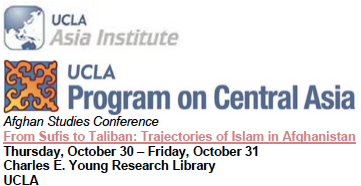
|
Providing idioms and organizations for both anti-state and anti-foreign mobilization, Islam has proven to be a vital socio-political resource in modern Afghanistan. Even as it has been deployed as the national cement of a multi-ethnic "Emirate," and then "Islamic Republic," Islam has been no less a destabilizing force in Afghan society. Despite the universal scholarly recognition of the centrality of Islam to modern Afghan history, its developmental trajectories have received relatively little sustained attention outside monographs and essays devoted to particular moments or movements. This conference will bring together specialists on the different historical periods, regions, and languages of Afghanistan to develop a more comprehensive, comparative, and developmental picture of Afghan Islam from the nineteenth century to the present, and to see beyond the unifying rhetoric of Islam into its disparate forms. Co-sponsored by the Center for Near Eastern Studies and the Center for the Study of Religion, with funding from the American Institute of Afghanistan Studies Event URL: http://international.ucla.edu/asia/event/10685 Thursday, October 30: Young Research Library Main Conference Room 9:15 Welcome and Opening Remarks Nile Green, Director, Program on Central Asia 9:30-11:15 Panel 1. Historical Formations Chair: Asma Sayeed (UCLA NELC/Islamic Studies) Arezou Azad (University of Oxford /Birmingham) The Caliphate and Afghanistan: Embedding Islam in Afghan Society Benjamin Hopkins (George Washington University) A Long History of the Talib-ilm/Taliban along the Afghan Frontier Robert McChesney, (NYU) Earning a ‘Living’: Making Religion Pay in Early Modern Central Asia 11:30-12:45 Panel 2. Modern Transformations Chair: James Gelvin (UCLA History) Faridullah Bezhan (Monash University) The Taliban and Women’s Agency in the Works of Two Female Afghanistani Writers, Homaira Qaderi and Masuda Khazan Bashir Ansari (Southern Methodist University) Afghanistan’s “Traditional” Islam in Transition: Deep Roots of the Shift to Radicalism 2:00-3:15 Panel 3. Contemporary Developments Chair: Bojan Petrovic (UCLA Political Science) Mariam Abou Zahab (INALCO, Paris) The Construction of a Shi'i Identity since the 1970s in Afghanistan/Pakistan: An Ethnicization of Shi'ism? Sonia Ahsan (Columbia University) Women and the Taliban: Histories of Feminism in Afghanistan 3:30-4:30 Perspectives on Religion and Afghanistan Chair: Nile Green Nushin Arbabzadah, UCLA Asma Sayeed, UCLA Mohammad Omar Sharifi, Boston University Zaman Stanizai, Pacifica Graduate Institute Friday, October 31: Young Research Library Presentation Room 9:30-10:30 Panel 1. New Directions in the Study of Islam and Politics in Afghanistan Chair: Mariam Abou-Zahab (INALCO, Paris) Mohammad Omar Sharifi (Boston University) Language, Poetry, and Identity in Afghanistan: Poetic Texts, Changing Contexts Waleed Ziad (Yale University) Hazrat Jeo Sahib: How Durrani Peshawar Revived Bukhara’s Sanctity 10:45-12:30 Panel 2. Afghanistan Studies at UCLA Chair: Benjamin Hopkins (George Washington University) Sohaib Baig (History) Afghanistan as a Hub for Trans-Imperial Revolutionaries: The Seven-Year Visit of ‘Ubaydullah Sindhi (1915-1922) Michael O’Sullivan (History) The Right Flank of the Ottomans' Eastern Policy: Ottoman Advisors in Kabul and Afghan terakki, 1908-1923 Marjan Wardaki (History) German-Afghan Connections in the Early 20th Century |
|
|
|
The UCLA Program on Central Asia is led by the Asia Institute in collaboration with the Center for European and Eurasian Studies and the Center for Near Eastern Studies. With Nile Green, UCLA Professor of History, as Director, the program promotes the inter-disciplinary and inter-regional study of Central Asia, serving as an 'intellectual crossroads' at which scholars working on India, China, the Middle East and Europe can exchange ideas with visiting specialists on Central Asia itself to advance scholarship and understanding of the region. Support for the Program on Central Asia is provided by the UCLA International Institute and the US Department of Education Title VI International and Foreign Language Education Programs. For more information on upcoming events and activities and to subscribe to the UCLA Program on Central Asia listserve, visit http://international.ucla.edu/asia/centralasia. |